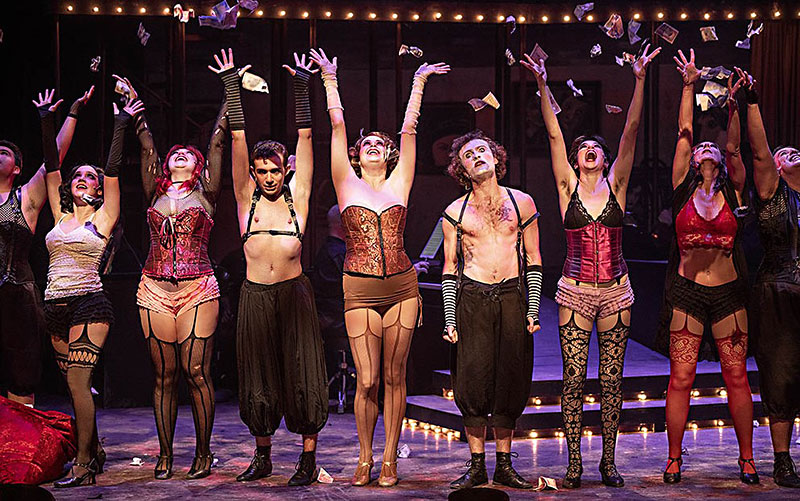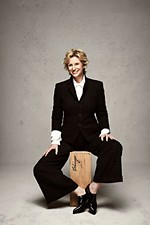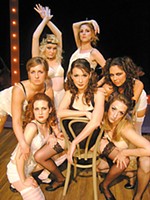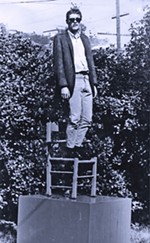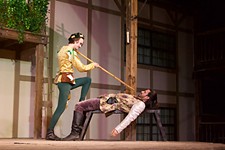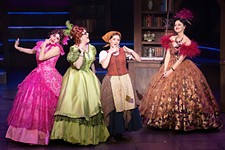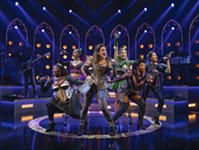Review: Georgetown Palace Theatre's Cabaret
A risky and risqué staging opens the company’s season of stalwart productions
Reviewed by Bob Abelman, Fri., Oct. 21, 2022
The iconic musical Cabaret, currently being staged by Georgetown Palace Theatre, takes us to the Kit Kat Klub in late 1920s Berlin as the Nazi Party ascends to power and the tragic life of nightclub singer Sally Bowles dramatically unfolds.
Cabaret's popularity and continued relevance has resulted in numerous revivals since its premiere on Broadway in 1966 and in London in 1968, which inspired the 1972 film famously starring Liza Minnelli as the overly theatrical Sally Bowles and Joel Grey as the nightclub's impish, androgynous, and sardonic Emcee. Joe Masteroff's poignant adaptation of John Van Druten's 1951 play I Am a Camera (itself an adaptation of Christopher Isherwood's novel Goodbye to Berlin), John Kander's memorable music, and Fred Ebb's powerful lyrics remained intact, but each subsequent rendition tweaked the original director's creative vision. None were as dramatic, dark, and decadent as the 1993 staging at the Donmar Warehouse in London's West End. Its decidedly seedy and stark set design emphasized the depravation of the time and complemented the seismic shifts in the portrayal of the characters. The reenvisioned Emcee was sexually charged and dangerously seductive. The burlesque troupe known as the Kit Kat Girls, bored and tired in the original production, looked as if they were ridden hard and put away wet in the revision, and their performances were purposefully drained of what little jauntiness they previously possessed. And Sally went from being lost to broken, spitting out lyrics to the title song – "Start by admitting/ From cradle to tomb/ Isn't that long a stay/ Life is a cabaret, old chum/ Only a cabaret, old chum/ And I love a cabaret" – as if they were a desperate plea for help.
And so, playhouses like Georgetown Palace Theatre have options when bringing their Cabaret to the stage: the sobering but safe and unquestionably entertaining original rendering, or the more disturbing, thought-provoking version. Director Emily Taylor, musical director Veronica DeSantos Ryan, and the designers – Evelyn Joy Hoelscher (choreography), Faith Castaneda (lighting and costumes), Steve Williams (scenic), and Justin Anderson (sound) – went with door No. 3 – a composite production grounded largely in the benign aspects of the original but inspired by the more risky and risqué elements found in the 1993 revival.
A sanitized and upscale speakeasy serves as the show's stationary set, where remarkably flexible and scantily clad Kit Kat Girls (Alicia Escobar, Samantha Ricker Watson, Mikah Mazza, Laurel Rothamel, Misty Barham, and Jesee Smart) and Boys (Trey Shonkwiler, Emile Sivero, Korben Lindstrom, and Nick Riley) share the stage with an excellent onstage band (conductor David Blackburn and Matt Russell on piano, Lannes Hilboldt on bass, Greg Wilson on woodwinds, Sparky Thomason on trumpet, and Rob Fedson on drums).
Changes in lighting and the introduction of some furniture establish the apartment where Sally (a genuinely likable Kris Glorioso, whose fine acting covers for some iffy vocals), lives with the naive, newly arrived, unsuccessful American novelist Cliff Bradshaw (a tepid David Dech). It also establishes the hallway where elderly boarding house owner Fräulein Schneider and her Jewish suitor Herr Schultz (an abundantly charming BJ Ortwein and Jerry Brown) exchange ill-fated flirtations, and the place where Nazi sympathizers – among them the hard-hearted prostitute Fräulein Kost and affable businessman Ernest Ludwig (a powerful Olivia Christie and Jake Maspero) – first show their true colors.
All this will appease Cabaret traditionalists. For the rest of us, we'll find our pleasure in Dawson MacLeod's remarkably unsettling, outside-the-box portrayal of the Emcee. The false smile and terrified eyes reveal the character's internal turbulence as Berlin transitions from the epicenter of avant-garde culture to a state of totalitarianism. MacLeod is willing to sacrifice humor for pathos and opportunities for amusement for moments of unease. And the character goes from dark to darker to darkest as the Nazi regime takes over the motherland.
While the sardonic version of the Emcee fit snugly into the world of the original production and the people who populated it, and the seductive Emcee in the revival did the same, MacLeod's Emcee is an outsider in the world created for this production, for he's the only one in the room feeling the weight of fascism's infiltration. Well, him and us. And this is what makes the Georgetown Palace Theatre's amalgamated production so intriguing.
Georgetown Palace Theatre's Cabaret
810 S. Austin Ave., Georgetown, 512/869-7469
georgetownpalace.com
Through Nov. 6
Running time: 2 hrs., 30 min.
* Editor's note, Friday, Oct. 21, 12:33pm: A previous version of this review neglected to credit musical director Veronica DeSantos Ryan. The Chronicle regrets the omission.





